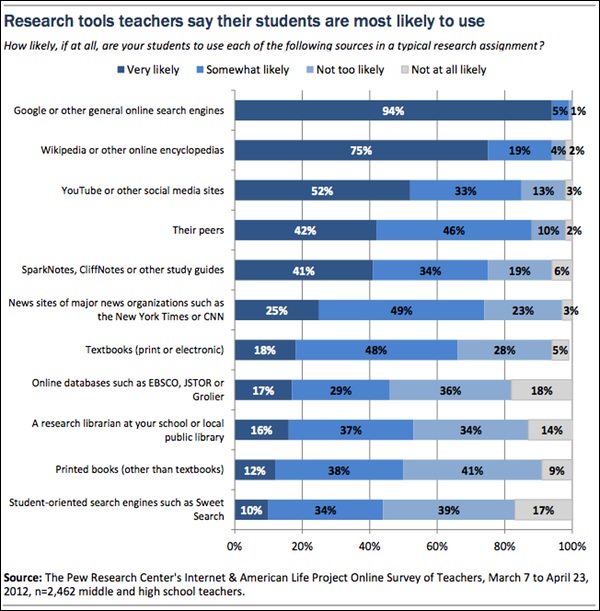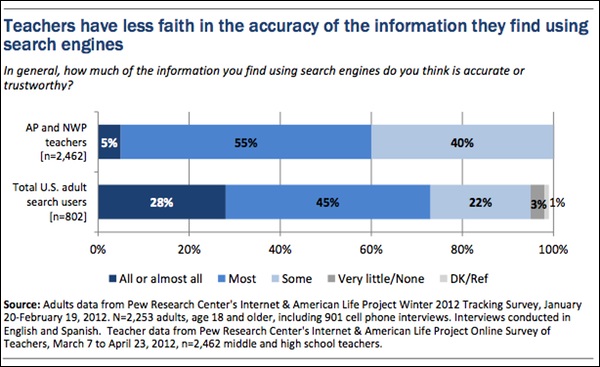94 Percent Of Teachers Say Students Equate “Research” With Using Google
It’s almost unanimous: 94 percent of U.S. teachers say their students equate “research” with using Google or other search engines — more so than Wikipedia and other online encyclopedias. But teachers are less sure that their students are effective searchers, and they’re more skeptical than most adults about the accuracy and trustworthiness of information that’s […]
 It’s almost unanimous: 94 percent of U.S. teachers say their students equate “research” with using Google or other search engines — more so than Wikipedia and other online encyclopedias.
It’s almost unanimous: 94 percent of U.S. teachers say their students equate “research” with using Google or other search engines — more so than Wikipedia and other online encyclopedias.
But teachers are less sure that their students are effective searchers, and they’re more skeptical than most adults about the accuracy and trustworthiness of information that’s found via search engines.
The data comes from a new study by the Pew Research Center’s Internet & American Life Project in conjunction with the College Board and the National Writing Project. Nearly 2,500 middle and high school teachers — the majority of whom teach Advanced Placement courses — took the online survey this spring. As a group, the teachers say that online search is a mixed bag with both pros and cons for the classroom and their students.
Search In The Classroom
There’s no question that search is impacting the classroom. A whopping 94 percent of teachers say their students equate “research” with using Google and other search engines. That’s substantially more than the 75 percent that say their students are “very likely” to use Wikipedia and online encyclopedias. More traditional research sources, like textbooks and librarians, are way down the list.
Despite the prevalence of search engine use, teachers are concerned about their students’ ability to do research online. Sixty-two percent of teachers gave their students high grades when it comes to their ability to use effective search terms — the other 38 percent gave students a “fair” or “poor” grade for searching skills.
Beyond that, only 52 percent of teachers say their students have a good understanding of how search results are generated.
Trust & Search Engine Results
Another concern is the accuracy and trustworthiness of content that ranks well in Google and other search engines. Only 40 percent of teachers say their students are good at assessing the quality and accuracy of information they find via online research.
And as for the teachers themselves, only five percent say “all/almost all” of the information they find via search engines is trustworthy — far less than the 28 percent of all adults who say the same.
With that in mind, the vast majority of teachers surveyed — 91 percent — say that a top priority in today’s schools should be teaching students how to judge the quality of information. Many teachers even said that they’ve been spending class time talking to students about how search engines work, how to grade the reliability of online information and how to improve search skills.
It’s a fascinating study overall, perhaps more so for any readers that — like me — work in the search industry and have school-aged children at home.
You can read the full report via Pew’s website.
Contributing authors are invited to create content for Search Engine Land and are chosen for their expertise and contribution to the search community. Our contributors work under the oversight of the editorial staff and contributions are checked for quality and relevance to our readers. The opinions they express are their own.
Related stories
New on Search Engine Land

